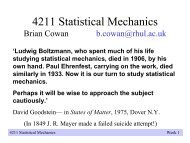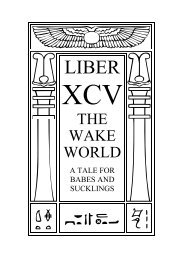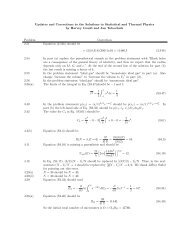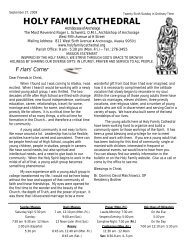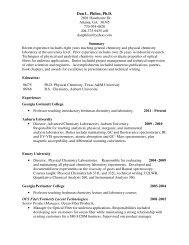Manifesto of the Communist Party - WebRing
Manifesto of the Communist Party - WebRing
Manifesto of the Communist Party - WebRing
Create successful ePaper yourself
Turn your PDF publications into a flip-book with our unique Google optimized e-Paper software.
<strong>the</strong> colonies, <strong>the</strong> increase in <strong>the</strong> means <strong>of</strong> exchange and in commodities generally, gave to<br />
commerce, to navigation, to industry, an impulse never before known, and <strong>the</strong>reby, to <strong>the</strong><br />
revolutionary element in <strong>the</strong> tottering feudal society, a rapid development.<br />
The feudal system <strong>of</strong> industry, under which industrial production was monopolised by closed<br />
guilds, now no longer sufficed for <strong>the</strong> growing wants <strong>of</strong> <strong>the</strong> new markets. The manufacturing<br />
system took its place. The guild-masters were pushed on one side by <strong>the</strong> manufacturing middle<br />
class; division <strong>of</strong> labour between <strong>the</strong> different corporate guilds vanished in <strong>the</strong> face <strong>of</strong> division <strong>of</strong><br />
labour in each single workshop.<br />
Meantime <strong>the</strong> markets kept ever growing, <strong>the</strong> demand ever rising. Even manufacture no longer<br />
sufficed. Thereupon, steam and machinery revolutionized indystrial production. The place <strong>of</strong><br />
manufacture was taken by <strong>the</strong> giant, Modern Industry, <strong>the</strong> place <strong>of</strong> <strong>the</strong> industrial middle class, by<br />
industrial millionaires, <strong>the</strong> leaders <strong>of</strong> whole industrial armies, <strong>the</strong> modern bourgeois.<br />
Modern industry has established <strong>the</strong> world market, for which <strong>the</strong> discovery <strong>of</strong> America paved<br />
<strong>the</strong> way. This market has given an immense development to commerce, to navigation, to<br />
communication by land. This development has, in its turn, reacted on <strong>the</strong> extension <strong>of</strong> industry;<br />
and in proportion as industry, commerce, navigation, railways extended, in <strong>the</strong> same proportion <strong>the</strong><br />
bourgeoisie developed, increased its capital, and pushed into <strong>the</strong> background every class handed<br />
down from <strong>the</strong> Middle Ages.<br />
We see, <strong>the</strong>refore, how <strong>the</strong> modern bourgeoisie is itself <strong>the</strong> product <strong>of</strong> a long course <strong>of</strong><br />
development, <strong>of</strong> a series <strong>of</strong> revolutions in <strong>the</strong> modes <strong>of</strong> production and <strong>of</strong> exchange.<br />
page 33<br />
Each step in <strong>the</strong> development <strong>of</strong> <strong>the</strong> bourgeoisie was accompanied by a corresponding political<br />
advance <strong>of</strong> that class.[29] An oppressed class under <strong>the</strong> sway <strong>of</strong> <strong>the</strong> feudal nobility, an armed and<br />
self-governing association in <strong>the</strong> mediaeval commune;[*] here independent urban republic (as in<br />
Italy and Germany),[30] <strong>the</strong>re taxable "third estate" <strong>of</strong> <strong>the</strong> monarchy (as in France),[31] afterwards, in<br />
<strong>the</strong> period <strong>of</strong> manufacture proper, serving ei<strong>the</strong>r <strong>the</strong> semi-feudal or <strong>the</strong> absolute monarchy as a<br />
counterpoise against <strong>the</strong> nobility, and, in fact, cornerstone <strong>of</strong> <strong>the</strong> great monarchies in general, <strong>the</strong><br />
bourgeoisie has at last, since <strong>the</strong> establishment <strong>of</strong> Modern Industry and <strong>of</strong> <strong>the</strong> world market,<br />
conquered for itself, in <strong>the</strong> modern representative State, exclusive political sway. The executive <strong>of</strong><br />
<strong>the</strong> modern State is but a committee for managing <strong>the</strong> common affairs <strong>of</strong> <strong>the</strong> whole bourgeoisie.<br />
The bourgeoisie, historically, has played a most revolutionary part.<br />
The bourgeoisie, wherever it has got <strong>the</strong> upper hand, has put an end to all feudal, patriarchal,<br />
idyllic relations. It has pitilessly torn asunder <strong>the</strong> motley feudal ties that bound man to his "natural<br />
superiors," and has left remaining no o<strong>the</strong>r nexus between man and man than naked self-interest,<br />
than<br />
* "Commune" was <strong>the</strong> name taken, in France, by <strong>the</strong> nascent towns even before <strong>the</strong>y had conquered from <strong>the</strong>ir<br />
feudal lords and masters local self-government and political rights as <strong>the</strong> "Third Estate." Generally speaking, for<br />
<strong>the</strong> economical development <strong>of</strong> <strong>the</strong> bourgeoisie, England is here taken as <strong>the</strong> typical country; for its political<br />
development, France. [Note by Engels to <strong>the</strong> English edition <strong>of</strong> 1888.]<br />
This was <strong>the</strong> name given <strong>the</strong>ir urban communities by <strong>the</strong> townsmen <strong>of</strong> Italy and France, after <strong>the</strong>y had purchased<br />
or wrested <strong>the</strong>ir initial rights <strong>of</strong> self-government from <strong>the</strong>ir feudal lords. [Note by Engels to <strong>the</strong> German edition <strong>of</strong>



